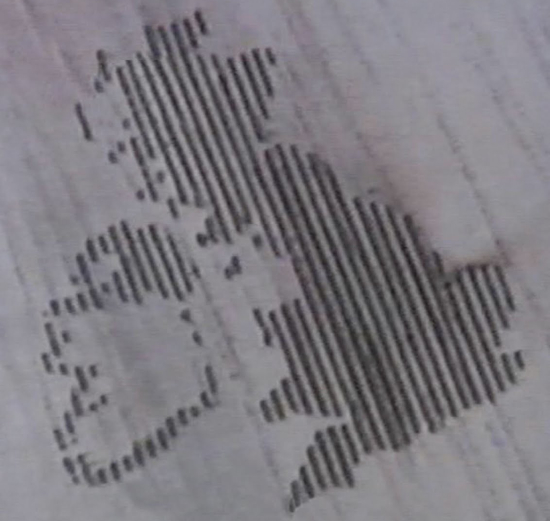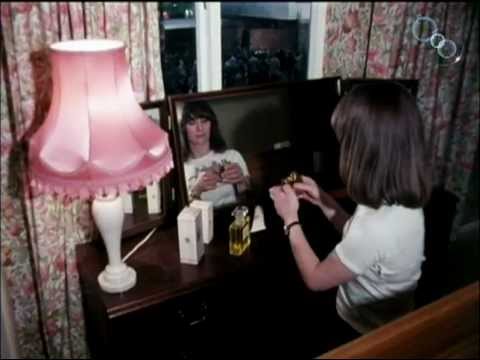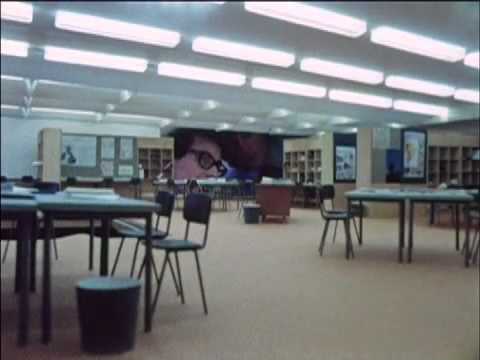My initial experience of this bizarre anthology seemed innocuous at first. After a long night of sonic battery at Supersonic festival, a group of friends and I wearily returned to our host’s flat in leafy Edgbaston. What we thought was a suitable set of late night visuals to slump in front of and fall asleep to quickly became one of the most disquieting assemblages of sound and vision that any of us had ever subjected ourselves to.
A litany of scavenging magpies, blanched-out animations, nuclear warnings and hollow-eyed glue sniffers fell across our beyond-tired eyes, all accompanied by uncomfortable tranches of squalling, ambient drone. There was little sleep to be had after what we had just endured. This might read like the worst introduction to MisinforMation anyone could have. Instead, it was the best.
A synergistic union of Central Office of Information footage (much of it unseen for decades) and one of the UK’s foremost experimental music collectives, the disc was first made available in a limited capacity in December 2010. Baron Mordant of Mordant Music explains his working method as a "rummage through the VHS mountain… I’d misinformed at least one reel of useable DVD in earnest". At first, there is indeed much mischief afoot. We begin with a coercion of one of the COI’s most infamous advertisements, dating back to 1984. In Mindless Reverie an ugly mob of magpies ransacks an unguarded suburban home as a metaphor for burglary. The image maligns that breed of bird just as severely as it impugns unwary families. This nightmare of violation and invasion is fostered further by prejudiced anthropomorphism – you have never seen such emaciated magpies in your life.
The music of MisinforMation is grounded in the fibrous electronic threat of Cabaret Voltaire, Throbbing Gristle and even early The The. The short Attack Plus 22 Days is suffused with a garish panic and scowled noise, overwhelmed by Mordant’s unkempt use of such neglected imagery. This "detritus" (as the Baron refers to it) is a powerful agent, disturbing the viewer to the point of disorientation. The 1970s properties in A Double Room In A Single Bed are visions of a near-future yet to come juxtaposed with narration (lifted from 1983’s Tackling Priority Estates) that’s concerned with social housing problems – the bucolic dream that Danny Boyle resorted to during the opening ceremony of London 2012 finds its antecedent here. The incongruity is made even more manifest by the footage of a Star Wars exhibit, as if the latter could be viewed as a paragon of scientific reality instead of the wanton synthesis of countless fantasy fictions that it truly is. The piece’s gaping maw drone makes light of such pomposity. Black And White Sound contains Mordant’s most successful splices: semi-utopian footage of laboratories is fused with dire warnings of decay post-synched into the mouths of long-gone presenters. It seems to suggest that you can say anything, should you so wish. It is a somber example of détournement – visuals of objectivity transformed into something considerably more ambivalent and confusing.
Yet there are some films that cannot be turned from their original purpose to suit another. The unrelentingly extreme vision of Attenuated Shadows asks only one question: can the fiction of an image contain grains of truth? On this evidence of this ‘illusion’, yes, they most certainly can. It’s procession of anomie and decay, the dead-eyed stares of early ’80s teenagers lost to their self-destructive urges, surrounded by alienating urban sprawl and dreaded, isolating wastelands. Yet it is a fiction, enacted for our benefit as a warning of not just what is to come for our youth, but what was already amongst us.
Directed by Peter Greenaway, Inkjet Printer (1979) is one of the most chilling pieces of the entire anthology, extolling not just the abilities of a new kind of printer but whatever else can be labeled in this new era of technology. It appears that we can label everything. ‘We Can Write Whatever You Want. And Change It Instantly. Again And Again’ could be the credo of HAL from 2001: A Space Odyssey, a glimpse of what the slogan ‘Living Tomorrow’ could really mean. Mordant’s harsh spindles of post-industrial noise are mere accompaniment here – despite his best efforts, these are films that manage to speak for entirely for themselves.
Mordant have more success with Artificially Sympathetic. Discretion and humanity characterize this treatment of an infamously foreboding 1986 advertisement, his restrained re-edit locating a sympathetic tone that coolly lifts the crushing impact of its AIDS prevention message. The acoustic drift and slight hints of melody are a real surprise after what, up to this point, has been an operation conducted in broad musical strokes.
Intertwining themes are intermittently explored: technological advances versus human frailty, the place of humanity in a mechanized environment, and the areas where these subjects collide and/or converge. In Ridyll, time and landscape are measured against our fragmentary species and its paltry existence. Mordant make the most placid and minor of aural contributions, spatial evocations of unreal moods that weave with a visual conjecture on prehistoric life.
Much of MisinforMation is constructed like a mutant science lesson, its menu a distorted modular curriculum not to be followed to the letter, but to be corrupted and viewed in non-linear ways. However we have been led, as surely as if we had plotted the journey ourselves. The longest and most involving of the entire modular system is The Dry Dock Dybbuk, which contains the most baleful filmmaking that Peter Greenaway can be held responsible for, desolate Sealink ferries and guileless lighthouses bleating their sentinel sounds across a blanched and dour coastline.
MisinforMation seeks to stir by accidents of evocation, the slightest measurements of imagined nostalgia caught in an airless receptacle from which anyone can select and embroider – just as Mordant Music has done. For all the Baron’s post-assembled reasoning ("a narrative manifested itself…"), the result is an entrancing final rake through the remnants of the defunct COI archive before its ossifying tomb is sealed forever.
MisinforMation is re-released on DVD this week by the BFI.




